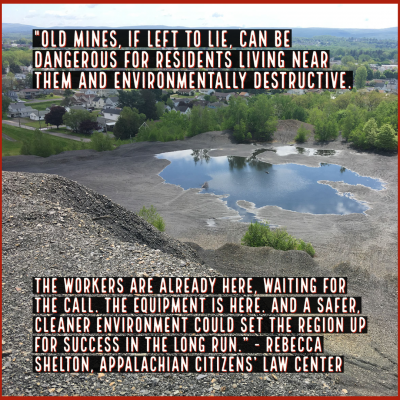Front Porch Blog
Shortly after taking office in January, President Biden issued an executive order establishing the White House Interagency Working Group on Coal and Power Plant Communities and Economic Revitalization. The interagency working group, or IWG, is charged with identifying and delivering federal financial resources to revitalize the economy in fossil-fuel impacted communities. This includes providing support for economic and social recovery and ensuring benefits and protections for fossil-fuel industry workers.
Members of the IWG include many of the president’s cabinet and policy advisors. The establishment of the IWG itself was a major milestone and reason for celebration — community leaders in coal communities have advocated long and hard for this sort of federal support. But the IWG’s work has only just begun.
As a first step in April, the IWG released a report with initial recommendations on supporting workers in hard-hit coal, oil, gas, and power plant communities, catalyzing economic revitalization, and creating good-paying union jobs. In its report, the IWG acknowledged that the current challenges are the result of years of disinvestment. To correct for this disinvestment, Appalachian Voices believes we must build new local and regional economies that provide opportunities for everyone and are diverse, sustainable, resilient, and equitable. Federal investment for coal-impacted communities should broadly support community economic development in addition to a focus on directly-affected coal workers and energy-related sectors.
This sort of federal investment in Appalachian communities is a huge opportunity for the region, the kind that does not come along often. But it’s critical that the money is spent wisely and in ways that build local wealth, health, sustainability and equity. That means that the people of the region should be involved throughout the process. To that end, here is a summary of the major provisions in the IWG report, our take on them, and the next steps.
Town Hall Events
The IWG’s April report identifies 25 “Priority Energy Communities” most at risk from coal-related declines for a series of public town hall listening sessions with senior administration officials. Listening to the communities most impacted by the decline of coal is critical to the success of any federal transition program, and will help to build understanding between the public and the administration.
We expect these 25 town halls to begin in the summer of 2021, but last for the next year or more. Appalachian Voices has urged the administration to hold town halls in a way that will maximize attendance, including by (1) holding the events on weekends; (2) ensuring enough time is allotted for the events so that all those in attendance have a chance to speak; (3) using local media such as newspapers and radio stations to promote the events; (4) collaborating with local governments, organizations, nonprofits, agencies, and labor unions to help with public awareness; (5) allowing for online and mail-in comment options; (6) providing at least one month notice before each event; and (7) live-streaming all in-person events. We want these local outreach efforts to succeed, and will be engaging with our partners across the country to ensure that people in coal-impacted areas have the tools and information they need to engage in this process.
Below we outline some of the topics discussed in the IWG’s initial report that you may want to include in your public comments if you live in a coal-impacted community. Stay tuned for date announcements and more information to help support your public comments.
The 25 communities
The report identified “the 25 communities most dependent on coal and coal power plant jobs today to prioritize for investment and engagement,” stating that the identified areas are most vulnerable to additional near-term coal mine and power plant closures. The report authors used data from the Bureau of Labor Statistics to identify the geographic areas where coal jobs are the highest percentage of total jobs in the area currently and rank communities in order of those with the highest coal dependency.
Unfortunately, this methodology leaves out a number of communities either where the jobs are more concentrated geographically (e.g., a non-metropolitan area where the coal jobs are concentrated in one or two counties, and other types of jobs are more concentrated in other counties within the area), as well as areas where coal jobs have already declined significantly over the past 10 years or more and communities have already been struggling with coal decline.
Appalachian Voices recommends the IWG expand the list of priority communities to include places that have already been hit hard by the coal transition and, as a result, may not show current high levels of coal employment, rather than focusing only on communities at risk of near-term decline. If your community has been impacted by the decline of coal but didn’t make the “Top 25” list, we recommend that you still submit a public comment, and lift up the specific examples you’ve experienced and your communities’ needs.
Map of the 25 Priority Energy Communities from Initial IWG Report
Zoom in and click for more detail. Map created in ARCGIS by Matt Hepler
Long-Term Support and Significant Investment for Transitioning Communities
As the IWG moves beyond their initial report, it must focus on ensuring long-term support and significant financial investment in transitioning communities. The communities and regions impacted by coal are in very different places along the arc of energy transition. In some regions, plants and mines are pending closure, and in others, the job losses are recent. In Appalachia, job losses have been escalating for decades. The administration’s approach to providing financial support to transitioning communities needs to be appropriately matched to these varying conditions, focusing on training and jobs for displaced workers in some places, and deeper investment in rebuilding entire economies in places that have experienced long-term negative impacts.
25 Priority Energy Communities from the IWG Initial Report
1) Southern West Virginia non-metropolitan area
2) East Kentucky non-metropolitan area
3) Wheeling, West Virginia-Ohio
4) Southwest Virginia non-metropolitan area
5) Alaska non-metropolitan area
6) West Kentucky non-metropolitan area
7) Bremerton-Silverdale, Washington
8) Eastern Wyoming non-metropolitan area
9) Western Wyoming non-metropolitan area
10) Arizona non-metropolitan area
11) Northern West Virginia non-metropolitan area
12) South Illinois non -metropolitan area
13) Central Utah non-metropolitan area
14) Southern Indiana non-metropolitan area
15) California -Lexington Park, Maryland
16) Farmington, New Mexico
17) Northeast Virginia non-metropolitan area
18) West North Dakota non-metropolitan area
19) Greeley, Colorado
20) College Station-Bryan, Texas
21) Southwest Alabama non-metropolitan area
22) Grand Junction, Colorado
23) Beckley, West Virginia
24) Charleston, West Virginia
25) Western Pennsylvania non-metropolitan area
These approaches are not mutually exclusive and will be needed in all impacted communities, but in different proportions, and at different times. This work cannot be accomplished during one or two presidential terms; it is a long-term commitment that our government and leaders must make, and to do so, it must make permanent the structures it is setting up.
The initial report identifies $38 billion in existing federal funding that can be used to help transitioning communities. This is funding that is technically already available to these communities, but we know from experience that the funding will not reach the communities most in need, due to local capacity restrictions (such as limited local government staffing and financial resources, workforce retraining, and healthcare). Funding must be made available for a broad set of community needs including education, childcare, workforce training, healthcare access, infrastructure, environmental remediation, entrepreneurship, small business development, community well-being, local government staffing, technical assistance, and general economic development. Federal funding for coal-impacted areas must be increased well above the levels identified as already available, and programs must be redesigned or new programs must be created in order to ensure the funding is actually accessible by those communities that need it the most.
Office of Energy and Economic Transition
While more funding is most certainly needed to help areas in transition, more funding in and of itself will not address the challenges faced by these communities, due to local government capacity limitations and low workforce participation rates due to high rates of disability, lack of health care, lack of childcare, and other social and health challenges. New strategies will be necessary to reach communities that do not trust or have sufficient experience with existing programs and/or lack the resources needed to successfully access them. The initial IWG report proposes a “one-stop shop for Energy Communities to access the range of federal investments that can support community revitalization, job creation, and energy workers.” The IWG will “establish and expand efforts to create” this one-stop shop by April 2022.
The communities most disadvantaged by the decline in coal often lack the resources (such as staff capacity, technical consultants, or match funding) to identify and utilize the federal resources available to them, meaning that state and federal funding that might be available to help with the economic transition is frequently inaccessible by those that are most in need. Existing programs tend to benefit a small subset of entities and communities that have access to technical expertise and staff capacity that helps them navigate often-complex federal programs.
A “one-stop-shop” — which we propose to be called the Office of Energy and Economic Transition — would make these programs more accessible, especially in places hit hardest by the transition from coal. The office would need to be composed of regional offices located within those communities most impacted by coal’s decline.
We urge the IWG and the administration to prioritize the creation and funding of this office. The administration should use the town hall events to gather more information from impacted community leaders regarding how this new office can best bridge their capacity gaps. We recommend attendees use the public comment opportunities to identify ways that such an office could support their communities.
Energy Community Advisory Group
The IWG report states that they are considering the formation of a formal Energy Community advisory group comprised of key constituencies including community groups; state, local, and tribal officials; environmental justice organizations; labor unions; and others. We will continue to encourage the IWG to establish such a group as soon as possible in order to ensure long-term input and engagement with the communities most impacted by the energy transition. Such long-term engagement will be critical to developing solutions that work and securing local support. It will also ensure that the administration’s work will incorporate the many on-the-ground, community-developed solutions.
If you plan to give public comment during the Town Hall process, consider mentioning the importance of a stakeholder advisory group and who from your community should be represented in such a group.
Unreclaimed Mine Lands and Black Lung Disease
The IWG initial report emphasized funding to restore and reclaim Abandoned Mine Lands (AML), as these elements have the potential to immediately create jobs while eliminating environmental and human health hazards. With AML funding mostly levied from coal industry severance fees, and the coal industry in decline, it is crucial that leaders identify new streams of funding for reclamation. In order to ensure the AML program and surface mining and reclamation regulations are implemented with maximum benefit to impacted communities, the administration must act swiftly to appoint a new director for the Office of Surface Mining Reclamation and Enforcement.
In addition, we were discouraged that the report did not mention disabled workers, particularly those disabled by black lung disease. Black lung disease among coal miners is a public health emergency: in Central Appalachia, one in five tenured miners has black lung disease. Current funding for the Black Lung Disability Trust Fund relies on the coal industry and expires this year, so it is critical to develop a long-term funding solution as the industry declines.
Moreover, the issue of coal company bankruptcy affects both disabled worker benefits and mine reclamation. We appreciate the report’s acknowledgement that bankruptcy code enables companies to forgo their responsibilities to communities and workers, but change to bankruptcy law is a substantial legislative issue. Some of these challenges could be at least partially prevented or remedied through other solutions. For example, surface mining regulatory reform and increased enforcement of existing laws could ensure that bonds are adequate to cover the costs of reclamation.
What’s next?
We anticipate the IWG will host the first town halls starting in late summer. At least one of these early events will likely occur in Appalachia. If you want to help get the word out about an event near you, please email Willie Dodson at willie@appvoices.org.
Who is in the IWG?
The co-chairs of the Interagency Working Group are National Climate Advisor Gina McCarthy and Assistant to the President for Economic Policy Brian Deese.
Additional members of the IWG include Treasury Secretary Janet Yellen, Interior Secretary Deb Haaland, Agriculture Secretary Tom Vilsack, Commerce Secretary Gina Raimondo, Labor Secretary Marty Walsh, Health and Human Services Secretary Xavier Becerra, Transportation Secretary Pete Buttigieg, Energy Secretary Jennifer Granholm, Education Secretary Miguel Cardona, EPA Administrator Michael Regan, Office of Management and Budget Acting Director Shalanda Young, Assistant to the President for Domestic Policy and Director of the Domestic Policy Council Susan Rice, and Federal Co-Chair of the Appalachian Regional Commission Gayle Manchin.
PREVIOUS
NEXT
Related News

Leave a comment
Your email address will not be published. Required fields are marked *




Leave a Comment